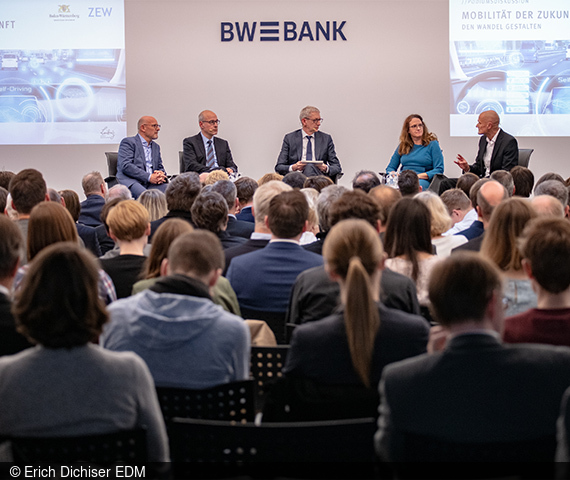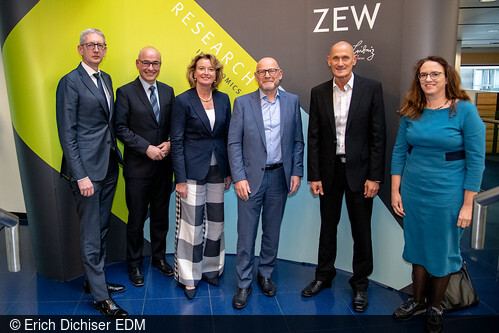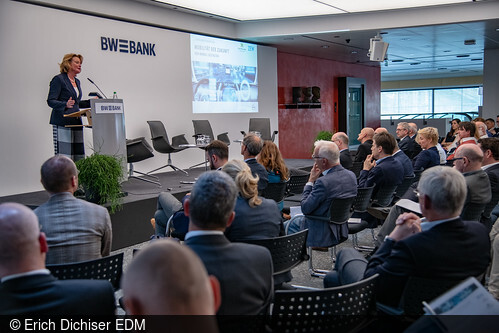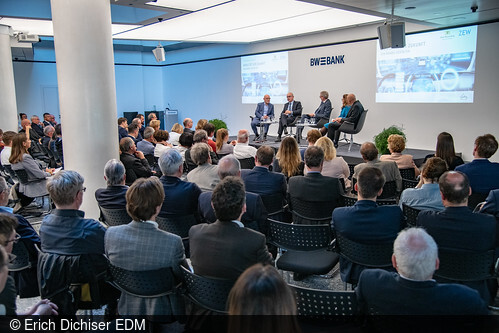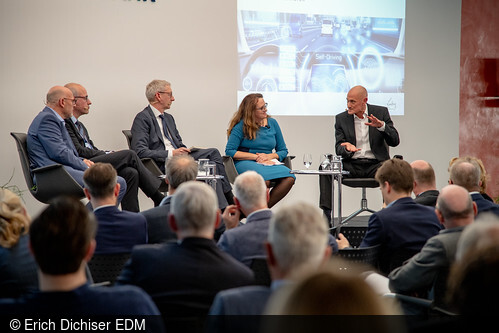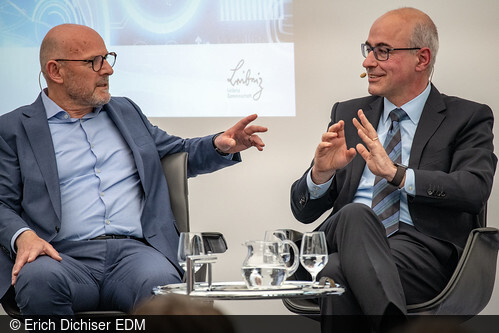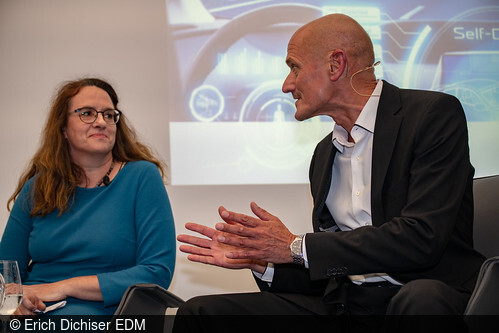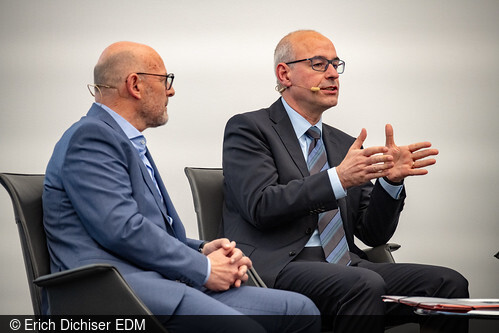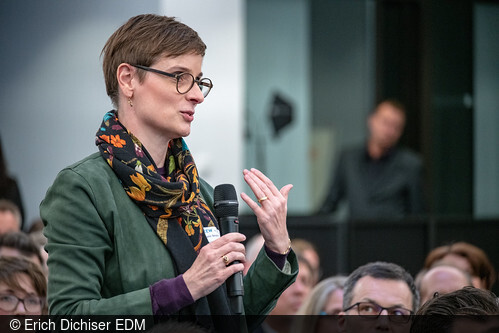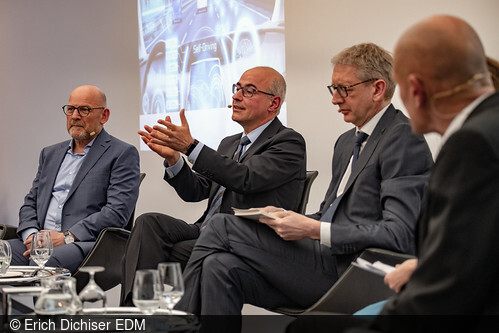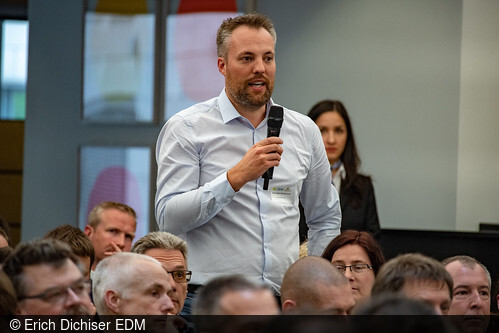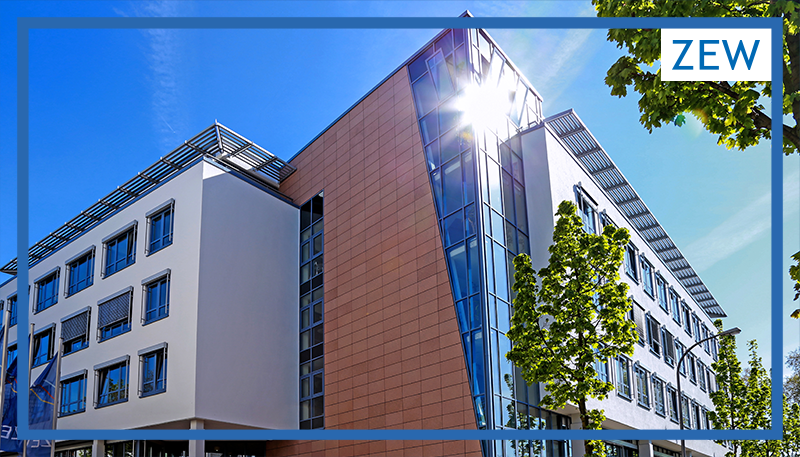The Change in Mobility Is a Complex Task
Public EventsPanel Debate in Stuttgart on New Traffic Concepts
The climate is changing and so is the mobility of people. Our infrastructure and transport networks are already congested, causing increasing levels of emissions that pollute the air in cities. Trends like alternative drive systems, car sharing and autonomous driving signal that a change in mobility is taking place. How can we achieve this change in such a way that we can move in a climate-friendly manner in the future? This was the central question of the panel debate on “Mobility of the Future – Shaping Change” jointly organised by the ZEW – Leibniz Centre for European Economic Research and the Baden-Württemberg Ministry of Transport on 14 May 2019 at BW Bank in Stuttgart.
In front of 200 guests, ZEW President Professor Achim Wambach, Baden-Württemberg’s Minister of Transport Winfried Hermann, Cordula Kropp, Professor for Technology Studies and Environmental Sociology at the University of Stuttgart, and Manfreg Fuhg, Head of Siemens Mobility Germany, held an exciting debate, which made clear just how controversial the topic is for business, politics and society.
“Such debates are important in order to raise our awareness of change and to seize the opportunities that emerge from it,” said Claudia Diem, board member of BW Bank and the ZEW Sponsors’ Association, at the beginning of the event. “In Stuttgart the problems and opportunities of mobility manifest themselves clearly,” emphasised Joachim Dorfs, editor-in-chief of the Stuttgarter Zeitung, who moderated the debate. Pollution and traffic jams stand opposed to the wealth and prosperity of the city and its surroundings which is mainly generated by the automotive industry.
During the discussion, ZEW President Achim Wambach quickly made it clear that with people’s increasing need for mobility, traffic must not be stopped but steered in the right direction. “A smart congestion charge, for example, has such a steering effect,” the economist stated. According to him, the future brings a variety of transport options. The automotive industry for example expects the first roadworthy pilot projects for autonomous driving by 2021. “Market forces must act on people’s preferences, and policymakers have many opportunities to shape them.”
Mobility change goes hand in hand with energy transition
Winfried Hermann adds, “Policymakers can shape this change.” However, motorised individual transport will increase even further if it is not systematically controlled. Individual transport is extremely costly, with 2.5 tons of a vehicle traditionally transporting about 80 kilograms of people. “It’s inefficient,” the minister stated. Shared mobility could be a solution to this problem. Technical progress must be made to ensure that the mobility of the population is sustainable in the long term. “We still consume a lot of space, energy and resources, especially in our cities,” said Hermann, “mobility change goes hand in hand with an energy transition.”
Time is a crucial factor here, stressed Manfred Fuhg. This becomes clear when focussing on how long we are stuck in traffic jams every day. “In times when vehicles are increasingly able to communicate with each other, we have the opportunity to optimise traffic,” said the Siemens manager. Digitalisation is the key here. Until a few years ago, there was no market for concepts such as intermodal transport, i.e. linked transport chains for people and goods, which now exists thanks to digitalisation.
At this point, Cordula Kropp argued that digitalisation per se was not climate-friendly. In the course of the transformation process, it must be taken into account that raw materials such as cobalt and lithium, which are necessary for the much-vaunted electric mobility, are often mined in politically unstable regions and hardly ever under climate-neutral conditions. “The mobility change is a joint effort,” the researcher continued. Policymakers must pave the way, negotiate the rules and set the regulatory framework; citizens, together with companies, on the other hand, are responsible for shaping this change. “We must be prepared for experimental phases,” said Kropp.
Stretching further the framework
However, in a risk-averse world, a lack of legal certainty makes companies act cautiously, ZEW President Achim Wambach argued and went on to explain: “A project like autonomous driving is hard for a company to handle on its own, and if it is, it will have to deal with the competition authorities.” The framework will therefore have to be stretched much further. Mobility data could be used to find out where and how much traffic there is and how this traffic could then be steered. „However, it is important to make the data publicly accessible,” said Wambach.
At the end of the evening, the reactions of the audience showed that this debate had not yet been concluded. How much energy does data transfer require? How can intelligent use of space be integrated into new transport concepts? And how can a traffic change be made understandable to people while taking the public along? These and more questions were discussed during the Q&A sessions following the panel debate.
ZEW would like to thank BW Bank Stuttgart for its support of the event.
